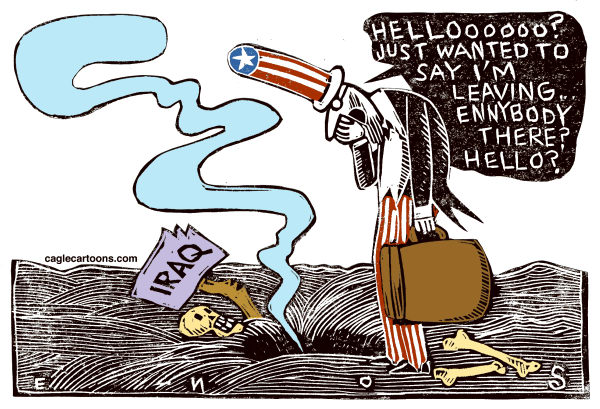
There was a time not so long ago when President Barack Obama boasted of how he had "ended" the Iraq War. It was, in his telling, a sign of his stalwart fidelity to his word.
A video produced by his 2012 presidential campaign was titled "Ending the War in Iraq: A Promise Kept." His website said in December 2011: "This month, President Obama is making good on his promise to bring the last American troops home from Iraq in time for the holidays."
The president portrayed the complete withdrawal of U.S. troops as testimony to his exemplary political character. "You know I say what I mean and I mean what I say," he told crowds during his re-election campaign. "I said I'd end the war in Iraq. I ended it."
That's as definitive a statement of responsibility as you get. But now that the president has "re-started" the war in Iraq -- with limited airstrikes against the terrorist group ISIS, which has thrived in the vacuum created, in part, by our total exit -- he is not in such a buoyantly boastful mood.
At a press availability over the weekend about his new bombing campaign, the president kvetched about all those people who keep insisting that he ended the Iraq War: "What I just find interesting is the degree to which this issue keeps on coming up, as if this was my decision."
It is true that the Bush administration had agreed to end our troop presence, and if we were going to stay, Obama had to negotiate a new "status of forces agreement" with the Iraqis. Why it didn't happen is a complicated question, and Iraqi resistance is part of the answer. But Obama was perfectly content with the outcome.
"The leaders of all the major Iraqi parties had privately told American commanders that they wanted several thousand military personnel to remain, to train Iraqi forces and to help track down insurgents," according to a definitive account in The New Yorker by Dexter Filkins.
Obama was "ambivalent about retaining even a small force in Iraq," he writes. American officials negotiating with the Iraqis were left without guidance from the White House for months, and when Iraqi Prime Minister Nouri al-Maliki offered to sign an executive agreement -- bypassing the problematic Iraq parliament -- the administration said "no."
Filkins quotes an Iraqi politician: "The American attitude was: Let's get out of here as quickly as possible."
And why not? This was the fulfillment of Obama's defining political promise. When we were out of Iraq entirely, he didn't say how regrettable it was; he declared "mission accomplished."
It's only after the ensuing disaster that we learn he was an innocent bystander. It may be that Iraq -- after being largely pacified by 2009 -- would have fallen apart even if we had maintained a residual force. But troops on the ground gave us the influence to restrain Maliki from his worst instincts.
Iraq is perhaps the purest expression of the Obama doctrine. We removed ourselves entirely from the country on the assumption that we could diminish our influence without baleful consequence and that there were effective substitutes to military power. Now that the most powerful terrorist group of modern times controls large parts of Iraq and neighboring Syria, we are back at war, although without the requisite seriousness or comprehensive strategy.
What is happening in Iraq is exactly what we fought to prevent with the surge in 2007 and 2008. It is heartbreaking commentary on President Obama's recklessness that we are now in an arguably worse position, with fewer options to reverse it. He never ended the Iraq War, as he so proudly said. He only abandoned it.
Comment by clicking here.



 Contact The Editor
Contact The Editor
 Articles By This Author
Articles By This Author